

Situation Response for Venezuelans. Situation Venezuela Situation. Hospital beds (per 1,000 people) - Colombia, United States, Venezuela, RB. Colombia Influx from Venezuela Assessment Report Apr 2018. People using safely managed drinking water services (% of population) - Colombia, United States. NPR Choice page. How Venezuelan migration is changing urban expansion in Cucuta, Colombia. This considerable influx of migrants is also highly concentrated in specific geographic pockets within cities, mostly in the peripheral suburban settlements.
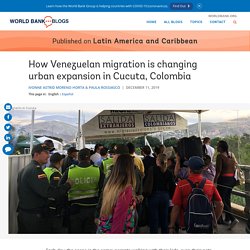
In these areas, sudden and uncontrolled urbanization is limiting the capacity of municipalities to effectively provide public services and conditions for social and economic development. Migrants and refugees face the same limitations to basic infrastructure and other government services long endured by local communities. Also, the occupation of public space by individuals will further accentuate the city’s lack of shelters and housing, progressively changing the urban landscape.
Venezuelan Migration and the Border Health Crisis in Colombia and Brazil - Shannon Doocy, Kathleen R. Page, Fernando de la Hoz, Paul Spiegel, Chris Beyrer, 2019. Introduction The Venezuelan economic, political, and health crisis has triggered an exodus of Venezuelans to countries throughout the region.
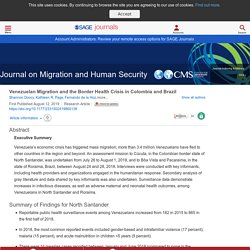
Hyperinflation in Venezuela is the highest in the world, at 1.37 million percent in 2018, with projections for 2019 in excess of 10 million percent (Reuters 2018). Venezuelan migrants in Colombia: A neglected crisis. Inequities in access to health care in different health systems: a study in municipalities of central Colombia and north-eastern Brazil. 1.Vargas I, Vázquez ML, Jane E: Equity and health systems reform in Latin America.
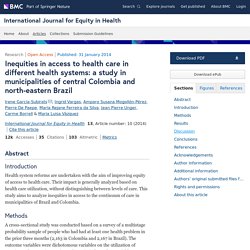
Cad Saude Publica. 2002, 18 (4): 927-937. 10.1590/S0102-311X2002000400003.PubMed Article Google Scholar 2.Culyer AJ, Wagstaff A: Equity and equality in health and health care. J Health Econ. 1993, 12 (4): 431-457. 10.1016/0167-6296(93)90004-X.CAS PubMed Article Google Scholar 3.van Doorslaer E, Wagstaff A, van der Burg H, Christiansen T, Citoni G, Di Biase R, Gerdtham UG, Gerfin M, Gross L, Häkinnen U: The redistributive effect of health care finance in twelve OECD countries. J Health Econ. 1999, 18 (3): 291-313. 10.1016/S0167-6296(98)00043-5.CAS PubMed Article Google Scholar 4.Suárez-Berenguela RM: Health System Inequalities and Inequities in Latin America and the Caribbean: Findings and policy implications.
II. Objectives and Functions. Transparencia y acceso a la información pública. Quienes Somos – Instituto Departamental de Salud. Financing Global Health. Country Profiles. Institute for Health Metrics and Evaluation (IHME).
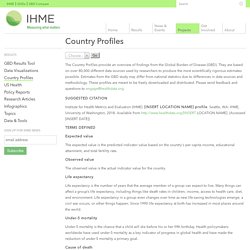
[INSERT LOCATION NAME] profile. Seattle, WA: IHME, University of Washington, 2018. Available from LOCATION NAME]. (Accessed [INSERT DATE]) Expected value The expected value is the predicted indicator value based on the country's per capita income, educational attainment, and total fertility rate. Observed value The observed value is the actual indicator value for the country. Life expectancy Life expectancy is the number of years that the average member of a group can expect to live. Under-5 mortality Under-5 mortality is the chance that a child will die before his or her fifth birthday. Cause of death Cause of death estimates show the root causes of deaths within a group, usually expressed as a rate (e.g., deaths per 100,000 population). YLLs YLLs stands for years of life lost. YLDs YLDs stands for years lived with disability. DALYs DALY stands for disability-adjusted life years. Risk factor Related Content. Spillover effects of the Venezuelan crisis: migration impacts in Colombia.
We use cookies to enhance your experience on our website.By continuing to use our website, you are agreeing to our use of cookies.
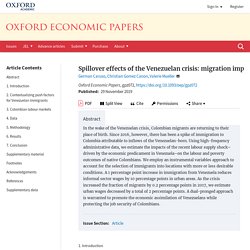
You can change your cookie settings at any time. <a href=" Find out more</a> Skip to Main Content Search Close Advanced Search Search Menu Article Navigation. Migration crisis in Venezuela and its impact on HIV in other countries: the case of Colombia. During the last few years, there has been a large migration flux of Venezuelan citizens and refugees.
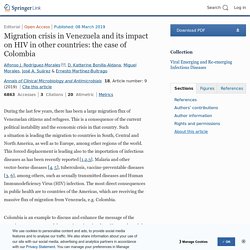
This is a consequence of the current political instability and the economic crisis in that country. Such a situation is leading the migration to countries in South, Central and North America, as well as to Europe, among other regions of the world. This forced displacement is leading also to the importation of infectious diseases as has been recently reported [1,2,3]. Malaria and other vector-borne diseases [4, 5], tuberculosis, vaccine-preventable diseases [3, 6], among others, such as sexually transmitted diseases and Human Immunodeficiency Virus (HIV) infection. The most direct consequences in public health are to countries of the Americas, which are receiving the massive flux of migration from Venezuela, e.g. Colombia is an example to discuss and enhance the message of the negative consequences of the massive migration from Venezuela and the impact on HIV in a near country. Health system resilience: Lebanon and the Syrian refugee crisis.
The impact of refugees on the health status and health services of host communities: Compounding bad with worse? - Dick - 1985 - Disasters. Although there have been a number of recent developments in our understanding of refugee health problems that have influenced policies and action, the effects of refugees on the health status and services of host communities remain relatively neglected.
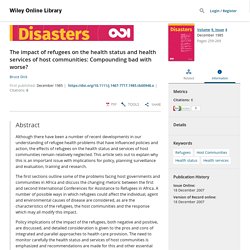
This article sets out to explain why this is an important issue with implications for policy, planning surveillance and evaluation, training and research. The first sections outline some of the problems facing host governments and communities in Africa and discuss the changing rhetoric between the first and second International Conferences for Assistance to Refugees in Africa. A number of possible ways in which refugees could affect the individual, agent and environmental causes of disease are considered, as are the characteristics of the refugees, the host communities and the response which may all modify this impact. Migrationandhealth. This series of situational and policy briefs summarises key practical and operational aspects of the COVID-19 response in relation to migrants and refugees.
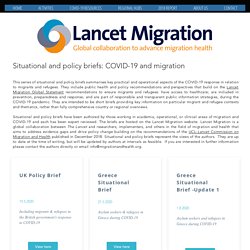
They include public health and policy recommendations and perspectives that build on the Lancet Migration Global Statement recommendations to ensure migrants and refugees: have access to healthcare; are included in prevention, preparedness and response; and are part of responsible and transparent public information strategies, during the COVID-19 pandemic.
They are intended to be short briefs providing key information on particular migrant and refugee contexts and thematics, rather than fully comprehensive country or regional overviews.